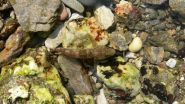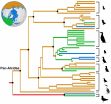Light pollution contributing to fledgling 'fallout'
Reducing light pollution may decrease number of grounded fledglings
2014-10-15
(Press-News.org) Turning the street lights off decreased the number of grounded fledglings, according to a study published October 15, 2014 in the open-access journal PLOS ONE by Airam Rodríguez and colleagues from Phillip Island Nature Parks, in Victoria, Australia, and Estación Biológica de Doñana, in Spain.
Thousands of birds are attracted to lights–sometimes referred to as light-pollution–every year worldwide during their first flights from their nests to the open ocean, a phenomenon called 'fallout.' Short-tailed shearwater breeding on the coast of Australia are also affected when fledgling chicks leave their nest about a month after their parents. In an effort to understand the magnitude of 'fallout,' the authors of this study have reported the number of fledging short-tailed shearwaters found grounded during evening and morning rescue patrols conducted at Phillip Island, Australia, during a 15-year period (1999-2013). Additionally, they assessed factors affecting numbers of grounded birds and mortality including date, moon phase, wind direction and speed, number of visitors, and holiday periods and tested whether turning lights off could make an impact on the number of birds found on the ground.
Over 8800 fledglings were found during the 15-year study period and almost 40% were dead or dying. This mortality rate was 4-8 times higher than reported elsewhere, at sites where searching for fledglings was more opportunistic rescue rather than regular patrols, indicating that mortality numbers may be underestimated in other locations. The researchers found more grounded birds in peak fledging, moonless, and windy nights. Mortality increased through the fledging period, in the mornings, and with increased traffic on holiday periods, but turning the road lights off decreased the number of grounded birds. While researchers could not control for the moon and wind, they suggest that reduction of light pollution and better traffic management might help mitigate artificial light-induced fledgling mortality.
INFORMATION:
In your coverage please use this URL to provide access to the freely available paper: http://dx.plos.org/10.1371/journal.pone.0110114
Citation: Rodríguez A, Burgan G, Dann P, Jessop R, Negro JJ, et al. (2014) Fatal Attraction of Short-Tailed Shearwaters to Artificial Lights. PLoS ONE 9(10): e110114.
doi:10.1371/journal.pone.0110114
Funding: AR was supported by a Marie Curie International Outgoing Fellowship within the 7th European Community Framework Programme (n 330655 FP7PEOPLE-2012-IOF). The funder had no role in study design, data collection and analysis, decision to publish, or preparation of the manuscript.
Competing Interests: One of the authors (André Chiaradia) currently serves as an Academic Editor or Guest Editor for this journal. Please note that this does not alter the authors' adherence to PLOS ONE Editorial policies and criteria.
ELSE PRESS RELEASES FROM THIS DATE:
2014-10-15
People who risk their lives to save strangers may do so without deliberation, according to an analysis of statements from more than 50 recognized civilian heroes, conducted by David Rand from Yale University and colleagues published October 15, 2014 in the open access journal PLOS ONE.
Scientists studying human cooperation recruited hundreds of participants to rate 51 statements made during published interviews by recipients of the Carnegie Hero Medal, given to civilians who risk their lives to save strangers. Study participants as well as a computer text analysis algorithm ...
2014-10-15
Research from the University of Exeter has revealed that the rock goby (Gobius paganellus), an unassuming little fish commonly found in rock pools around Britain, southern Europe, and North Africa, is a master of camouflage and can rapidly change colour to conceal itself against its background.
Whether hiding from predators or from families hunting in rock pools, the rock goby can change both its colour and brightness to match its background in just one minute.
Dr Martin Stevens from the Centre for Ecology and Conservation at the University of Exeter's Penryn Campus ...
2014-10-15
An investigation into how patient outcomes are assessed in clinical trials has revealed a worrying lack of consistency, raising concerns about funding being wasted on the acquisition of poor quality data.
Information collected through clinical trials plays a crucial role in improving the standard of patient care. Patient Reported Outcomes (PROs) inform our understanding of how certain treatments and interventions work by evaluating their effectiveness, and any potential side effects, from the patient perspective.
Patients in trials are commonly invited to fill in questionnaires ...
2014-10-15
NEWPORT, Ore. – Pacific sleeper sharks, a large, slow-moving species thought of as primarily a scavenger or predator of fish, may be preying on something a bit larger – protected Steller sea lions in the Gulf of Alaska.
A new study found the first indirect evidence that this cold-blooded shark that can grow to a length of more than 20 feet – longer than a great white shark – may be an opportunistic predator of juvenile Steller sea lions.
Results of the study have just been published in the journal Fishery Bulletin. The findings are important, ...
2014-10-15
Astronomers using the National Science Foundation's Green Bank Telescope (GBT) in West Virginia, along with data from other large radio telescopes, have discovered that our nearest galactic neighbors, the dwarf spheroidal galaxies, are devoid of star-forming gas, and that our Milky Way Galaxy is to blame.
These new radio observations, which are the highest sensitivity of their kind ever undertaken, reveal that within a well-defined boundary around our Galaxy, dwarf galaxies are completely devoid of hydrogen gas; beyond this point, dwarf galaxies are teeming with star-forming ...
2014-10-15
"If you have a coin and flip it just once, what does that tell you about the odds of heads versus tails?" asks Heather Knutson, assistant professor of planetary science at Caltech. "It tells you almost nothing. It's the same with planetary systems," she says.
For as long as astronomers have been looking to the skies, we have had just one planetary system—our own—to study in depth. That means we have only gotten to know a handful of possible outcomes of the planet formation process, and we cannot say much about whether the features observed in our solar system ...
2014-10-15
For those most severely affected, treating epilepsy means drilling through the skull deep into the brain to destroy the small area where the seizures originate – invasive, dangerous and with a long recovery period.
Five years ago, a team of Vanderbilt engineers wondered: Is it possible to address epileptic seizures in a less invasive way? They decided it would be possible. Because the area of the brain involved is the hippocampus, which is located at the bottom of the brain, they could develop a robotic device that pokes through the cheek and enters the brain from ...
2014-10-15
Having had children – particularly early in life – and a dysfunctional romantic relationship are the two most frequently cited reasons when low-income mothers are asked about why they find themselves in poverty. So say American researchers Kristin Mickelson of the School of Social and Behavioral Sciences at Arizona State University, and Emily Hazlett of Kent State University and the Northeast Ohio Medical University, in a new article published in Springer's journal Sex Roles. The researchers believe that how a woman answers the question of "why me?" when thinking ...
2014-10-15
Modern-day puffins and auks have long been recognized as environmental indicator species for ongoing faunal shifts, and fossil records now indicate that ancient relatives were similarly informative. Researchers have found that puffins and auks may have been at their most diverse and widespread levels during a relatively warm period of Earth's history. The results also explain how past extinctions have shaped the geographic distribution and population size of existing species.
Authors Adam Smith of the National Evolutionary Synthesis Center (NESCent) in Durham, N.C., and ...
2014-10-15
COLLEGE PARK, Md. – A new analysis of global energy use, economics and the climate shows that without new climate policies, expanding the current bounty of inexpensive natural gas alone would not slow the growth of global greenhouse gas emissions worldwide over the long term, according to a study appearing today in Nature.
Because natural gas emits half the carbon dioxide of coal, many people hoped the recent natural gas boom could help slow climate change—and according to government analyses, natural gas did contribute partially to a decline in U.S. carbon ...
LAST 30 PRESS RELEASES:
[Press-News.org] Light pollution contributing to fledgling 'fallout'
Reducing light pollution may decrease number of grounded fledglings





